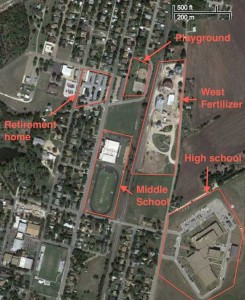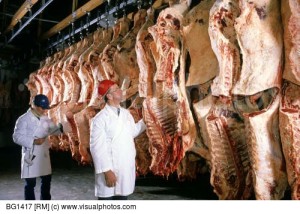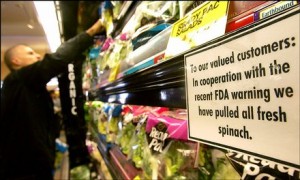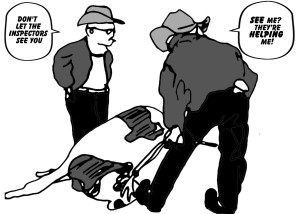Should there be laws against telemarketing robocalls? Payday lenders? False advertising? Should we have consumer protection agencies? Food and drug laws? Restrictive zoning and land use regulations? Obamacare mandates?
Issues like these are debated endlessly, and are politically divisive, with partisans and ideologues lining up for or against government intrusion into what many see as just doing business.
After the West, Texas, fertilizer plant explosion that killed 15 people and injured over 200, most of whom had no idea that a local business had been storing material that functionally was a huge bomb on its property — the same material used to build the bomb that destroyed the Oklahoma City federal building — this aerial map was circulated on the internet under the derisive label of “libertarian zoning.”
 A year later, the massive landslide that buried the town of Oso, Washington, raised similar issues. That is, in retrospect, it seems obvious that county land use officials shouldn’t have issued permits for a residential development in a known landslide danger zone.
A year later, the massive landslide that buried the town of Oso, Washington, raised similar issues. That is, in retrospect, it seems obvious that county land use officials shouldn’t have issued permits for a residential development in a known landslide danger zone.
Obvious, that is, to people who believe government should protect its citizens from developers who put profit above human lives, as distinct from people who prefer to do as they damn well please without interference, often under the guise of “liberty” or “freedom.” Left to their own devices, the latter will build fertilizer plants and residential developments wherever it’s profitable, and they believe they have a right to do so.
This philosophical clash over the role of government defines a major fault line in American politics. Liberals believe government should protect people from exploitation. Even libertarians want some government protection. I’ll use some simple examples to illustrate the similarities and differences of thinking about this.
 We all agree armed robbery should be against the law. No one wants to be forced to give up his money or possessions under threat of bodily harm. So we enact laws, hire police, and build prisons to discourage such behavior.
We all agree armed robbery should be against the law. No one wants to be forced to give up his money or possessions under threat of bodily harm. So we enact laws, hire police, and build prisons to discourage such behavior.
Likewise, we criminalize certain forms of stealing, although the penalties are less severe because the absence of physical coercion makes theft (at least in theory) a less dangerous and harmful crime.
But here is where things begin to get murky. Our system allows, overlooks, or doesn’t enforce rules against some behavior that arguably constitutes theft. Is obtaining money or property by deception stealing? If so, should deceptive business practices (such as false advertising, rigging gas pumps to dispense less than a gallon, etc.) be considered crimes? Or if not, at least banned via regulation?
 “Laissez faire” ideologues who crave completely free markets are apt to argue the only protection consumers need is “caveat emptor” — let the buyer beware. Actually, this isn’t good for the economy or business, because in a completely unregulated marketplace, we’d distrust each other so much that trade and commerce would suffer. At this point, they may trot out “Big Brother” arguments, and talk about “individual responsibility.”
“Laissez faire” ideologues who crave completely free markets are apt to argue the only protection consumers need is “caveat emptor” — let the buyer beware. Actually, this isn’t good for the economy or business, because in a completely unregulated marketplace, we’d distrust each other so much that trade and commerce would suffer. At this point, they may trot out “Big Brother” arguments, and talk about “individual responsibility.”
But these are weak arguments in light of the complexity of modern society. How is a typical consumer to know whether a car, food or drug product, or toy is safe and as advertised? He can’t; this requires expertise and resources available only to corporate and governmental organizations.
Regulation can take many forms, from outright prohibition — such as zoning laws that don’t  allow you to store explosives near houses (except in Texas) — to monitoring, e.g. health inspections of restaurants, and weights and measures inspections of gas pumps and grocery scales. Some regulation merely requires providing information; examples of this include Truth-In-Lending laws and SEC regulations. Legislators tend to tailor regulations to specific needs.
allow you to store explosives near houses (except in Texas) — to monitoring, e.g. health inspections of restaurants, and weights and measures inspections of gas pumps and grocery scales. Some regulation merely requires providing information; examples of this include Truth-In-Lending laws and SEC regulations. Legislators tend to tailor regulations to specific needs.
Liberals support reasonable and well-thought-out regulation of business to protect investors, workers, and consumers. They’re suspicious of the motives of opponents of regulation, although this may sometimes be unfair. As a consumer, I see myself in an adversarial relationship with businesses trying to sell goods and services to me, and I’m at a disadvantage if no one is policing business behavior.
 During the G. W. Bush administration, we got a glimpse of how things can break down when the regulation of business envisioned by liberals is cast aside. He proposed eliminating federal meat inspectors and giving the money budgeted for their function to the meatpacking industry to pay its own inspectors. Would you eat meat inspected by people whose jobs depend on maximizing company profits?
During the G. W. Bush administration, we got a glimpse of how things can break down when the regulation of business envisioned by liberals is cast aside. He proposed eliminating federal meat inspectors and giving the money budgeted for their function to the meatpacking industry to pay its own inspectors. Would you eat meat inspected by people whose jobs depend on maximizing company profits?
Clearly, such inspectors can’t be trusted to protect the public interest, no matter how well-meaning they are. In reality, the Bush administration was dogged by tainted food recalls and drug scandals. Those experiments with deregulation should have discredited the laissez-faire approach for good.